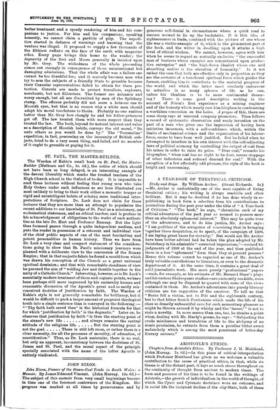John Nixon, Pioneer of the Steam-Coal Trade in South Wales
: a
• Memoir. By James Edmund Vincent. (John Murray. 10a. 6d.) — The subject of this memoir from very small beginnings became in time one of the foremost coalowners of the Kingdom. His .. progress was marked at all times by perseverance and by generous self-denial in circumstances where a quick road to success seemed to lie up the backstairs. It is this ides of righteousness in trade, combined with the picture of one whose life was a visible example of it, which is the pleasantest part of the book, and the writer in dwelling upon it attains a high level of ethical wisdom. We cannot, however, agree with him when he seems to regard as mutually exclusive "the successful man of business whose energies are concentrated upon produc- tive enterprise" and "the high-flown idealist whose one and absorbing motive is the elevation of humanity." Is it not rather the case that both are effective only in proportion as they are the servants of a beneficent spiritual force which guides the former, enabling him to contribute to the material progress of the world, and which the latter must similarly endeavour to actualise in as many spheres of life as he can, unless his idealism is to be mere sentimental dream- ing ? There is some good descriptive writing in the account of Nixon's first experience as a mining engineer and of the honesty which nearly cost him his place in condemning a worthless concession on the Loire. A propos of this, there are some sharp raps at unsound company promoters. Then follows a record of systematic observation and ready invention on the part of a man who gives one the impression of having been initiative incarnate, with a self-confidence which, within the limits of mechanical science and the organisation of his labour- force, seems to have been well justified. But he failed when he attempted to interfere in his own interest with the self-adjusting laws of political economy by controlling the output of coal from his mines in order to raise its price. "Dear coal," remarks his biographer, "when coal has no right to be dear, means stoppage of other industries and reduced demand for coal." With the exception of a few affectedly odd phrases, the style of the book is bright and unassuming.


















































 Previous page
Previous page